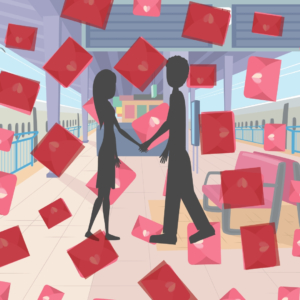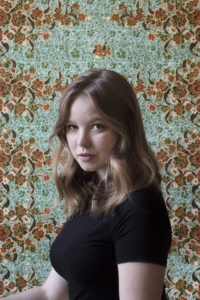School Lunch: Time Zones

Quinn Christensen
[creative nonfiction]
The day after he left the city, I fluttered awake feeling gloriously pretty. The night before had been so surreal, so bittersweet, that just thinking about it made me a little dizzy. And he was supposed to call soon. I looked down at my fingers, reminding myself that they had touched him just hours before, and realized that they were shaking. Carefully, I slipped out of bed and tiptoed down the hall, breathing in the smell of the checkerboard floor and empty cups of tea. Sometimes I think I remember that smell better than I remember most things about him as a person.
When I write about him, I feel like I’m keeping track: these are the things that I remember. These are the things that I know were true.
I know that I stopped halfway between the bedroom and the kitchen. I know that I sat on the floor in the pale morning light, and that the tile was cold. I don’t remember who called who, just that suddenly, he was there—praised and forbidden all at once, tiny on my phone screen but bigger when I pretended we were pressing our noses together. I remember that call so well—his laugh, hushed. My cheeks turning pink. The way he glowed in the soft lamplight, so different from my morning sun. I remember his two a.m. meeting my eight a.m., and I remember us, breathing, together and miles apart.
I didn’t want to leave the city. The front of the train station was the last place I could clearly picture him, waving to me as I turned back to the flat, everyone else as fixated on the lights as we were on each other.
I know that I called him again after he flew home. And I know that I wrote him letters. I had bought the envelopes before either of us left the city, and I think I believed they would do a better job of bridging the ocean because they carried both of our fingerprints. As if this was some kind of magic that could prevent things from getting lost in translation. Now, I think that must have been too much pressure for those poor envelopes—they were just paper, after all. Paper and ink. Saltwater is not good for paper and ink. I remember one night, when he was home but I was still away, the ink began to run. He was talking to another girl back home. I had been away for nearly a month, but suddenly, the suburbs felt so inexplicably close that I could hardly breathe. The envelopes I hadn’t sent lay spread out around me, piled thicker than the carpet. I began tearing off scraps, filling them with words, writing until one sliced my thumb open—and then I bled.
The blood came thick. And fast. Soon, it had soaked through every word I’d written, leaving me with a pulpy mess of cherry-stained envelopes and the empty feeling you get in your chest after crying too long. When I laid the papers out to dry in the foreign wind, they became the first red flags.
I kept the bloody envelopes, but I sent him the rest. And I asked about them when he moved to my neighborhood, three weeks before we broke up. It had been nearly a year, then, since I’d come home to the suburbs where he seemed so big. He told me that the letters I wrote him had gotten lost in the move. And I have tried to count the number of times I called him while I was still away; I have tried to find the old text messages. It’s useless. All that’s left are the flags, in my own handwriting—what I saw and how I kept it.
I remember thinking how strange it was that we were so mismatched by the end, living in the same town, when we had seemed so aligned from separate continents. It was as if the time zones followed us home. We were breathing, together, awake at the right times, but I can’t help but to think that somehow I stayed in the sunlight and he in the twilight. There were too many slip ups. Too many miscommunications. It doesn’t make sense. I wrote everything out so meticulously.
He still exists, of course. He exists in the way I used to fall asleep, pretending I could hear his heartbeat, so much steadier than we were, so much less certain than I thought we could be. He exists around corners, his voice through walls, just over the riverbend, just out of reach—but always just out of reach.
I write him as his eyes and then as his teeth. I write us as a romance and then as a tragedy; I say that I am indecisive and then I say that he made me so. And that house, his new house, the one on my side of the river, the one I pass by more often than I saw him while we were still together—he is so close now that some days I think it is his breath instead of the breeze, and we are farther apart than we have ever been.
Meanwhile, my lungs move on their own. He is gone from my bed. He is gone from the tree where I told him to wait for me, he is gone from his own front yard. But somehow, even though it is halfway around the world, I can still picture him so clearly that day at the train station. Everywhere else, he exists only in my writing, but there, he was flesh and blood.
Someday, I will go back to the city. A part of me wonders if he is still there. If I am still there, undone in all the right ways, starry-eyed and never once hurt. I wonder if there exists a copy of us somehow, in the only place that we were ever together all at once—our breath in sync, and still close enough to touch.
Quinn Christensen is a writer and student from St. Paul, MN. Her work has appeared in Amaryllis. When she was five, she wanted to be a scientist, a writer, and a princess. Her plans have not changed. You can find Quinn on Instagram at @quinnjillayne.





